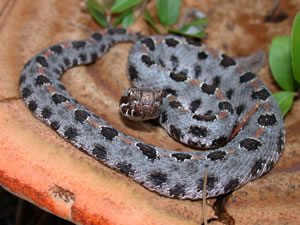04 July 2011 by wftv.com

KISSIMMEE, Fla. -- A tourist from Texas was bitten by a rattlesnake in Kissimmee, WFTV learned on Monday. Officers said the man was bitten, at the Windsor Hills Resort.
Wayne Wilburn was taken to Florida Hospital Celebration and is in intensive care. Officials said Wilburn will spend at least three nights in ICU before he is released.
Officials told WFTV that the type of rattlesnake that bit Wilburn is responsible for more bites in Florida than any other venomous snake.
Wilburn, investigators said, was bitten on his thumb by a pigmy rattlesnake.
"It's hurting tremendously. He doesn't really know how to describe it," said Wilburn's wife, Marla Wilburn.
Marla said they arrived at the Windsor Hills Resort near Disney World on Saturday afternoon. That same evening, the family of four went to the pool, when they came across a pigmy rattlesnake.
WFTV researched and found that pigmy rattlesnakes are common in Central Florida, but normally found near lakes or pond and not pools. And although the snake is only one-foot-long to two-feet-long, officials said they are aggressive and dangerous.
Wilburn tried to kill the rattlesnake with a stick, but the snake bit his thumb.
"What was he doing trying to kill the snake?" WFTV reporter Tim Barber asked Marla. "Why didn't he leave it alone?"
"He has such a huge heart that he was in fear of the children," she replied.
Doctors at Florida Hospital Celebration had anti-venom on hand and gave him three doses.
"He's got huge bags under his eyes. He is sweating," Marla said.
Marla said she is worried about her husband, and she is also trying to take care of her kids.
"They don't understand why their father is not with them on what is supposed to be a happy time," she said.
Wilburn is expected to make a full recovery, but doctors said they do not want him going back to Texas until Friday.
Pygmy rattlesnakes are small, but dangerous snakes. Wildlife officials said the snakes are found throughout Florida, most commonly near small waterways.
While it is a rattlesnake, it sounds like a small buzzing insect. Their venom is not considered life-threatening, but can cause a person to lose a finger or toe.
GO BACK